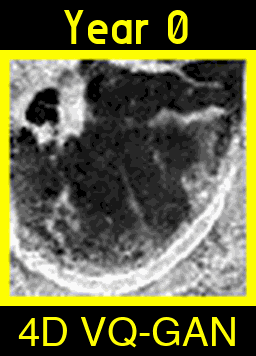4D VQ-GAN: A World Model for Synthesising Medical Scans at Any Time Point for Personalised Disease Progression Modelling of Idiopathic Pulmonary Fibrosis
An Zhao*, Moucheng Xu*, Ahmed H. Shahin, and 4 more authors
International Conference on Medical Imaging with Deep Learning (MIDL) 2025, Feb 2025
Understanding the progression trajectories of diseases is crucial for early diagnosis and effective treatment planning. This is especially vital for life-threatening conditions such as Idiopathic Pulmonary Fibrosis (IPF), a chronic, progressive lung disease with a prognosis comparable to many cancers. Computed tomography (CT) imaging has been established as a reliable diagnostic tool for IPF. Accurately predicting future CT scans of early-stage IPF patients can aid in developing better treatment strategies, thereby improving survival outcomes. As inspired by the recent success of world models in generating video-based virtual physical worlds, we present the first world model for IPF, to synthesize realistic scans of early-stage IPF patients at any time point. We term our model 4D Vector Quantised Generative Adversarial Networks (4D-VQ-GAN). Our model is trained using a two-stage approach. In the first stage, a 3D-VQ-GAN is trained to reconstruct CT volumes. In the second stage, a Neural Ordinary Differential Equation (ODE) model is trained to capture the temporal dynamics of the quantised embeddings, which are generated by the encoder trained in the first stage. For clinical validation, we conduct survival analysis using imaging biomarkers derived from generated CT scans and achieve a C-index either better than or comparable to that of biomarkers derived from the real CT scans. The survival analysis results suggest the potential clinical utility inherent to generated longitudinal CT scans, showing that they can reliably predict survival outcomes.


